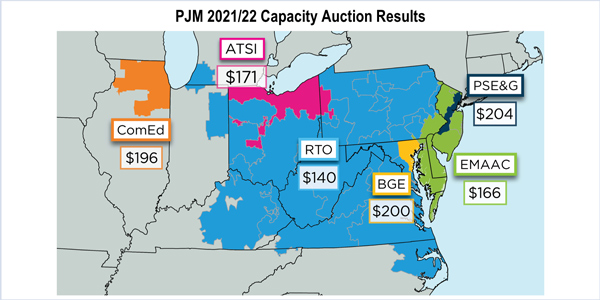By Christen Smith
PJM generators seeking must-offer exceptions will lose their capacity interconnection rights (CIRs) unless they meet Capacity Performance requirements within five years under Tariff changes approved by FERC on Monday (ER19-2417).
Rejecting arguments from some of PJM’s largest utilities, the commission said the joint PJM-Independent Market Monitor proposal was needed to mitigate market power and hoarding of CIRs.
Exelon, Duke Energy and Public Service Enterprise Group had contended the revocation of CIRs was overly punitive and that CIRs are a contractual right resulting from investments and not granted on a “use it or lose it” basis.
The commission disagreed. “The interconnection service agreement or wholesale market participation agreement, which is signed by the seller, explicitly provides that CIRs are subject to the terms of the Tariff, which may change over time. … We agree with PJM that sellers that are neither meeting nor attempting to meet the Capacity Performance resource requirements should not be able to retain capacity resource status and CIRs indefinitely through must-offer exceptions.
“We do not agree with the protesters’ arguments regarding the types of hardships sellers could face if they lose their CIRs,” FERC continued. “The proposed procedures for removal of CIRs because of a resource status change are the same Tariff procedures used for removal of CIRs after a resource deactivates. After a resource loses its capacity resource status, the seller is able for one year to transfer the CIRs or submit a new generation interconnection request that contemplates the use of the same CIRs. Sellers also may choose to continue to participate in the PJM markets as an energy resource.”
Sellers will have up to five years to develop and complete necessary upgrades to achieve CP status, which FERC noted “is consistent with the time frames for new resources to complete upgrades and reach commercial operation.”
The changes, endorsed at the Markets and Reliability Committee in April, will require existing capacity resources not offered in three consecutive auctions to change to energy-only status. A resource receiving a must-offer exception must also file a plan showing how it will become able to satisfy CP requirements or forfeit its CIRs. Resources would be granted exceptions for no more than two auctions. (See Load Interests Endorse PJM-IMM Must-offer Proposal.)
The commission approved the proposal, effective Sept. 23, with the new provisions first affecting the 2023/24 delivery year.
“The main motion would permit hoarding of CIRs inappropriately,” Monitor Joe Bowring said at the time. “We continue to believe the compromise we worked out with PJM makes the most sense.”
FERC shot down arguments from Exelon, Duke, PSEG and FirstEnergy that PJM has exaggerated the potential for capacity sellers to exercise market power and that the change would encourage unit retirements.
“The underlying purpose of the must-offer requirement is to ensure that sellers do not withhold capacity resources from [Reliability Pricing Model] auctions and potentially exert market power,” the commission wrote. “We concur with the IMM that the historical frequency of exception requests is irrelevant and that a small number of units in constrained locations in the market could have significant impact on prices. We find that the proposed revisions to the must-offer exception procedures and limitations on the number of exceptions are consistent with the purpose of preventing sellers from physically withholding capacity. We also agree that these provisions will prevent hoarding of CIRs by resources that are not performing as a capacity resource.”
FERC was also unmoved by arguments the proposal could result in generators making hasty investment decisions. “PJM has concluded a multiyear transitional period to the Capacity Performance resource requirements, and through that process, sellers have had opportunities to determine if upgrades were necessary for existing resources to meet those requirements,” it said.
The commission directed PJM to submit a compliance filing to add some clarifying language and correct a ministerial error in one of its Tariff citations.




